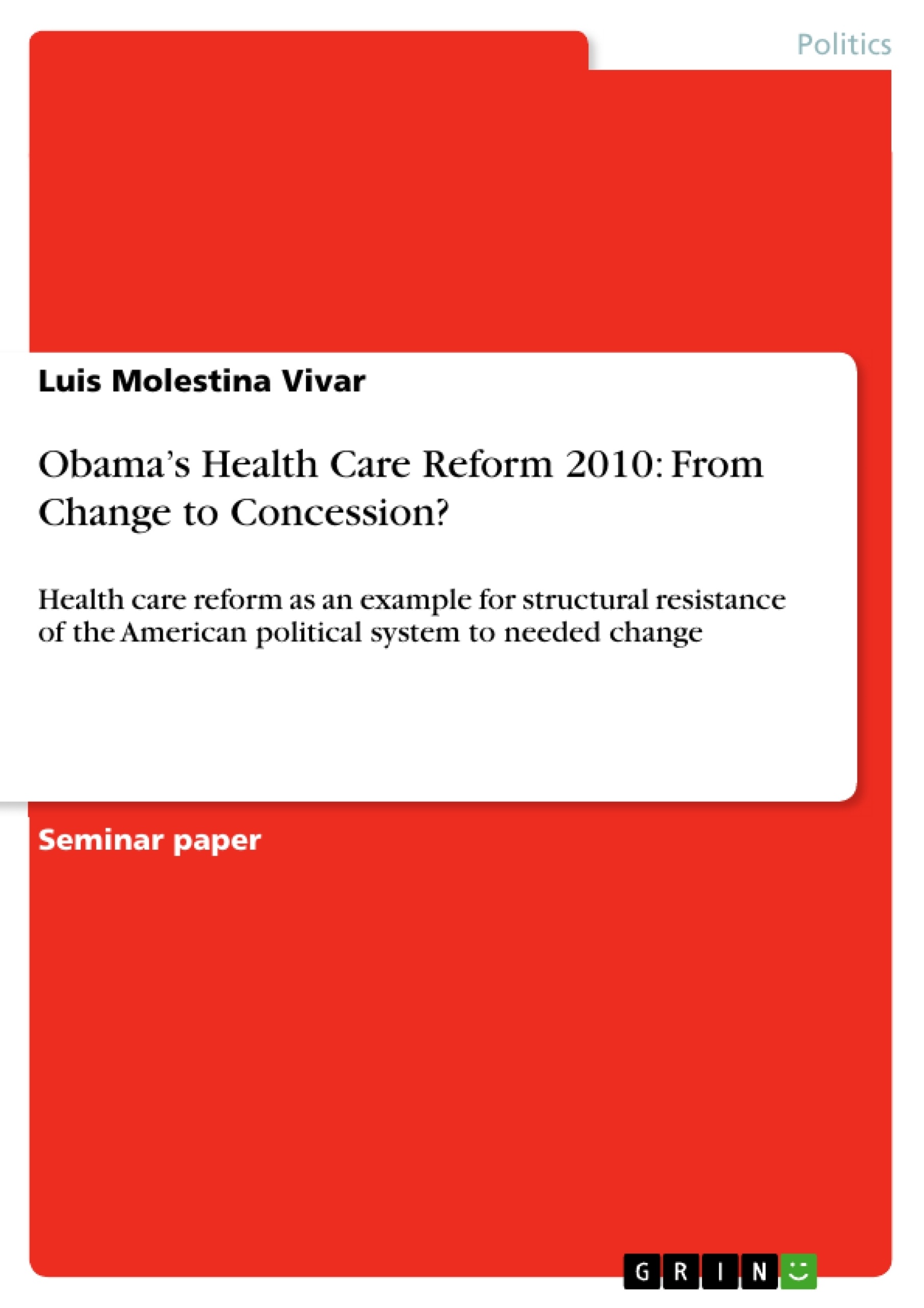Regarding Obama's health care reform 2010, this paper aims to examine a supposed incongruence of the social democratic ideal of an affordable health care system with the US political system. It tries to shed light into the paradox of an unequal and ineffective health care system on the one hand and strong resistance against any type of reform on the other. Major obstacles in the legislative process, such as the Republican Party and the impact of interest groups, are examined. It should become clear that the neo-liberal ideal of a free market coined by many Republicans, was an important obstacle to Obama’s health care reform. However, much more important was the enormous impact of interest groups, which can be regarded as the main driving forces in hindering smooth legislation.
Inhaltsverzeichnis (Table of Contents)
- Introduction
- The US Health Care System Until 2010: Urgency to Reform
- From Change to Concession: Obama's Initial Plan & the Final Reform
- Obama's Vision: America's Affordable Health Choices Act of 2009 and the Public Option
- Obama's Concession: The Patient Protection and Affordable Care Act & the Health Care Education Reconciliation Act of 2010
- The Legislative Process: Major Obstacles to Health Care Reform
- The Republican Opposition in the Legislative Process
- The Impact of Interest Groups in the Legislative Process
- Conclusion
Zielsetzung und Themenschwerpunkte (Objectives and Key Themes)
This paper aims to examine the social democratic ideal of an affordable health care system in the context of the US political system, specifically focusing on the 2010 Patient Protection and Affordable Care Act (PPACA) and the Health Care Education Reconciliation Act of 2010 (HCERA). The paper analyzes the shortcomings of the US health care system, explores Obama's initial reform proposals, and examines the reasons behind the significant differences between the initial vision and the final legislation. It also investigates the role of major obstacles in the legislative process, such as the Republican Party and the influence of interest groups.
- The urgent need for health care reform in the United States.
- The shortcomings of the existing US health care system, including high costs, limited access, and inefficiencies.
- The challenges faced by Obama in enacting health care reform.
- The role of political opposition and interest groups in shaping the final legislation.
- The impact of the PPACA and HCERA on the US health care system.
Zusammenfassung der Kapitel (Chapter Summaries)
- Introduction: The chapter introduces the context of Obama's promise to reform the US health care system, highlighting the system's high costs, lack of insurance coverage, and overall inefficiencies. It also outlines the paper's objective to analyze the legislative process and the factors contributing to the final health care reform legislation.
- The US Health Care System Until 2010: Urgency to Reform: This chapter details the shortcomings of the US health care system, including the dominance of private insurance companies, the inadequacies of public programs like Medicaid and Medicare, and the challenges faced by individuals in accessing affordable health insurance. The chapter emphasizes the urgency for reform to address these issues.
- From Change to Concession: Obama's Initial Plan & the Final Reform: This chapter examines Obama's initial vision for health care reform, as outlined in the America's Affordable Health Choices Act of 2009 (AAHCA), including the concept of a public option. It then analyzes the final health care reform legislation, the PPACA and HCERA, highlighting the significant concessions made from the original plan.
- The Legislative Process: Major Obstacles to Health Care Reform: This chapter delves into the challenges faced by Obama during the legislative process, focusing on the opposition from the Republican Party and the influence of interest groups. It examines how these factors contributed to the differences between the AAHCA and the final PPACA and HCERA legislation.
Schlüsselwörter (Keywords)
The paper focuses on the key themes of health care reform, the US political system, legislative process, interest groups, the Affordable Care Act, and the impact of political opposition on social policy. It examines the interplay between the ideal of affordable health care and the realities of the US political system, exploring the role of key players like the Republican Party and powerful interest groups in shaping the final legislation.
Frequently Asked Questions
What was the goal of Obama's health care reform in 2010?
The goal was to make health care more affordable, increase insurance coverage, and address inefficiencies in the existing US health care system.
What is the "Public Option"?
The Public Option was a proposal for a government-run health insurance plan that would compete with private insurers, but it was ultimately dropped from the final legislation.
Why did Republicans oppose the reform?
Many Republicans followed a neo-liberal ideal of a free market and argued that the reform constituted excessive government interference in the economy.
How did interest groups impact the legislative process?
Powerful interest groups (e.g., from the insurance and pharmaceutical industries) acted as major driving forces in hindering smooth legislation and forcing concessions.
What is the difference between PPACA and HCERA?
The Patient Protection and Affordable Care Act (PPACA) is the main law, while the Health Care Education Reconciliation Act (HCERA) was used to make final amendments and adjustments to it.
- Quote paper
- Luis Molestina Vivar (Author), 2011, Obama’s Health Care Reform 2010: From Change to Concession?, Munich, GRIN Verlag, https://www.grin.com/document/174170



